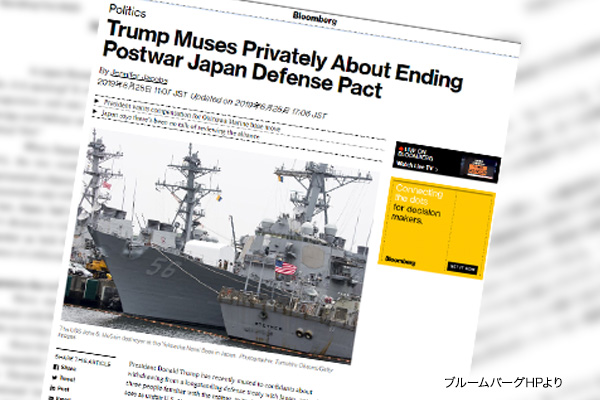“Japan’s fate was changed by the United States twice in history - the arrival of Commodore Matthew Perry’s black ship in 1853 and Japan’s defeat by the U.S. in World War II in 1945. The third black ship may approach Japan from the other side of the Pacific,” I wrote at the conclusion of my column titled “Analyzing Fast-changing World” on the January 2019 issue of “Seiron” monthly magazine. The third black ship has come. However, Japan’s government, ruling party and most news media made off-the-point responses.
Trump’s remark represents U.S. consensus
On June 25, Bloomberg reported that U.S. President Donald Trump had mused about possible abolition by the U.S. of a security treaty with Japan in his private talk. “There has not been a talk as reported,” Japanese Chief Cabinet Secretary Yoshihide Suga said in a manner to strongly deny the report. In a telephone interview with Fox Business Network on June 26, however, Trump said: “If Japan is attacked, we will fight World War III. We will go in and protect them with our lives and with our treasure. We will fight at all costs. But if we are attacked, Japan doesn’t have to help us at all. They can watch [the attack] on a Sony television.” The remark amounted to a bitter sarcasm. At a press conference after the Osaka Group of 20 Summit on June 29, President Trump reiterated his complaint against the unfairness of the Japan-U.S. Security Treaty while denying any idea of abolishing the treaty.
Trump’s remark on Fox Business Network might have told Suga that the president was not joking. The Japanese government spokesman also said that the U.S. government confirmed that the Bloomberg report ran counter to the U.S. government position. Is President Trump separate from the U.S. government? Which U.S. government official told Japan that the Trump remark had no relation with the U.S. government? Is the chief cabinet secretary allowed to make public such sensitive bilateral discussion?
“The Japanese side thinks President Trump’s complaint regarding security was designed to gain fruit that can appeal to his constituencies in Japan-U.S. trade negotiations,” the Asahi Shimbun newspaper said in its morning edition on June 29, revealing a low-level interpretation. Suga as well as most Japanese media are trying to shrug off the Trump remark. Why do they fail to realize that the remark represents a general U.S. consensus? Do they feel nothing when they imagine an opposite situation where young Japanese are shedding blood in fighting to defend the U.S. while young Americans are watching it on TV?
Chance for Japan to break away with postwar regime
I interpret President Trump gave a jolt to the Japanese who have been absurd to make up an evasive Yoshida Doctrine pursuing a lightly armed, economic power only to achieve affluence, and to defend the Constitution of Japan at all cost that is only an outdated basic occupation law.
The U.S. had aimed at making Japan a country that cannot fight militarily. However, the time has changed dramatically. China has risen as a military power, while the U.S. now thinks its own national interests first. What Japan should do in response is clear. The chance has come for Japan to break away with the postwar regime as advocated by Prime Minister Shinzo Abe.
Tadae Takubo is Vice President of Japan Institute for National Fundamentals and a professor emeritus at Kyorin University.


